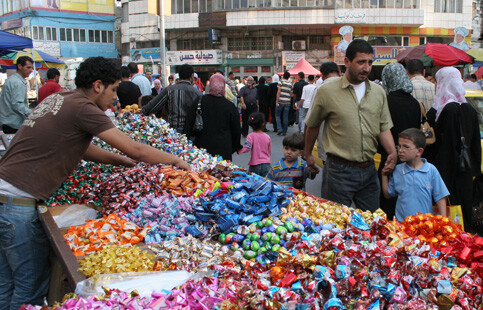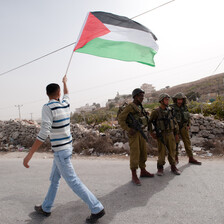
Sweets are sold in the city center of the West Bank city of Nablus, October 2007. (Rami Swidan/MaanImages)
Many Palestinians that I met during my travels in the West Bank told me that to know what Palestine really was about and meant, I had to go to Nablus. Most of them also told me that Nablus was their favorite city. After spending five weeks there this summer, I understand why.
Arriving from Ramallah, I am immediately confronted by the infamous Huwwara checkpoint on the outskirts of Nabuls. Hundreds of taxis and minibuses are parked on both sides of the checkpoint. One needs them to leave the city and to get inside. Since the start of the second Palestinian intifada in September 2000, entry to Nablus by car or other vehicle is largely forbidden. People cross the checkpoint on foot, on their way in and out.
Once in a public taxi, it is only a five minute drive to Nablus’ vibrant city center. It is there that I realized that Nablus was like nowhere else in the West Bank.
The city center is bustling with life. It is the best example I’ve seen so far of controlled chaos: cars come out of nowhere, people chat in the middle of the road, falafel shops at every street corner, a man sells coffee to stationary drivers, fruit vendors sell their produce, people wave passersby to stop for a chat and “welcome, how are you” comes from all directions. Nablus is non-stop. One hears, smells, tastes and sees here — all at once.
Everyone I meet here smiles, laughs and invites me to their homes for tea, asking me about my country. Everyone seems so happy to see me here. Everyone is happy to see a foreigner, an international, because not many come to Nablus. Walking around the city I quickly realize that there is no tourism here. Only a few non-governmental organizations operate, bringing a trickle of internationals to Nablus. People want to know my story and I want to know theirs. They want to understand why the world has forgotten them and I want to understand what has happened to them. I cannot refuse and decide to film them and give them a platform to express themselves. After a few interviews, it rapidly becomes obvious to me that everyone has a story here.
Bashir, who works as a French translator for a non-governmental organization based in Nablus, tells me that he had to stop his studies for a while because he could not afford it. He had to work in Ramallah for long hours, making only 20 shekels ($5) a day. Like nearly 70 percent of the population in Nablus, both his parents are unemployed. This is a huge increase compared to the 1997 rate of 14.2 percent. Nablus’ citizens have lost 60 percent of their income since the start of the second Palestinian intifada. Most people here are young (50 percent of the population is under 20) and highly educated. However, most of the youth here are either unemployed or work in shops selling anything they can. Shops can be open for up to ten hours a day without a single customer as residents simply don’t have the money to spend.
The director of an educational organization that operates in refugee camps in the Nablus area, Hakim tells me that every time he hears the Israeli army during the night, he wakes up, gets dressed and sits quietly on his sofa waiting for them. Not because he’s guilty of anything except being Palestinian. The situation is extraordinary as no one is safe in Nablus at night. Although Nablus was one of the first cities to welcome a Palestinian police force late last year, it is only deployed from 6am until midnight. After midnight the Israeli army takes over and nearly every night it enters the city and its refugee camps. Using loudspeakers, sound bombs and weapons, the army arrests Palestinians, often ransacking their homes, beating them and their families, sometimes killing them. Even during the day, the Israeli army acts with virtual impunity. A police officer told me that the Israelis sometimes call them during the day to tell them that they’ll be down (the army base overlooks the city, on top of a mountain) in a few minutes. They simply clear their posts to let the army do “its job.”
Hassan, a teacher of Arabic and Hebrew, tells me that one day he was arrested while going through Huwwara checkpoint. He spent 11 months in jail and to this day no one has told him why. The only thing he knows is that it was administrative detention. In every story I hear, prison comes up. For a male citizen of Nablus, prison time in Israel is pretty much compulsory. Nearly half of Nablus’s male residents have been incarcerated by Israel, oftentimes they are arrested without knowing why or told when they will be released.
Marouf, a medical worker, tells me about the April and June 2002 invasions of Nablus. He was working as a volunteer with the fire brigade and the Palestine Red Crescent Society, and was nearly killed twice by the Israeli army. Israeli soldiers fired on him even though he was wearing identifying clothing and was familiar to them as for five weeks he had been working in the Old City, which was devastated during the invasions. Marouf witnessed many blatant human rights violations by the army. Emergency medical teams were not allowed to do their job properly and to rescue people. Many died because they were not taken to a hospital in time. Marouf and his team were once forbidden to leave Nablus’ besieged Old City. They had to stay there for 12 days without edible food.
And then there is Saed who lost his mother in 2002 when she was assassinated by an Israeli sniper. There is Islam who twice saw the Israeli army occupying his house and could not go out for days at a time. There is Alaa from An-Najah University (the biggest university in the West Bank) who cannot sleep at night because of nightmares due to multiple Israeli army invasions and beatings in the Old City at night. There is Amad who went to jail with his whole family for three months in 2005.
And then there is a precocious girl, 17 years old, from Balata refugee camp, who tells me, on my last day in Nablus, while sharing a meal people from the camp had prepared:
“Tell me. What was the image you had of us before coming here? Did you think we were all killers? Did you think we were all crazy? Because I’ve got friends in Europe who told me that over there people think we are all crazy and terrorists.”
She adds, “You know it hurts me so much when I hear things like this. … We’re just normal people and we want to live a normal life. But life for us is hard here. Can you tell the truth to your people when you go back to Europe? Can you tell them who we really are, please?”
Frank Barat is a member of Palestine Solidarity Campaign and the Israeli Committee Against House Demolitions. (http://www.icahd.org/eng/) He can be reached through his blog.





